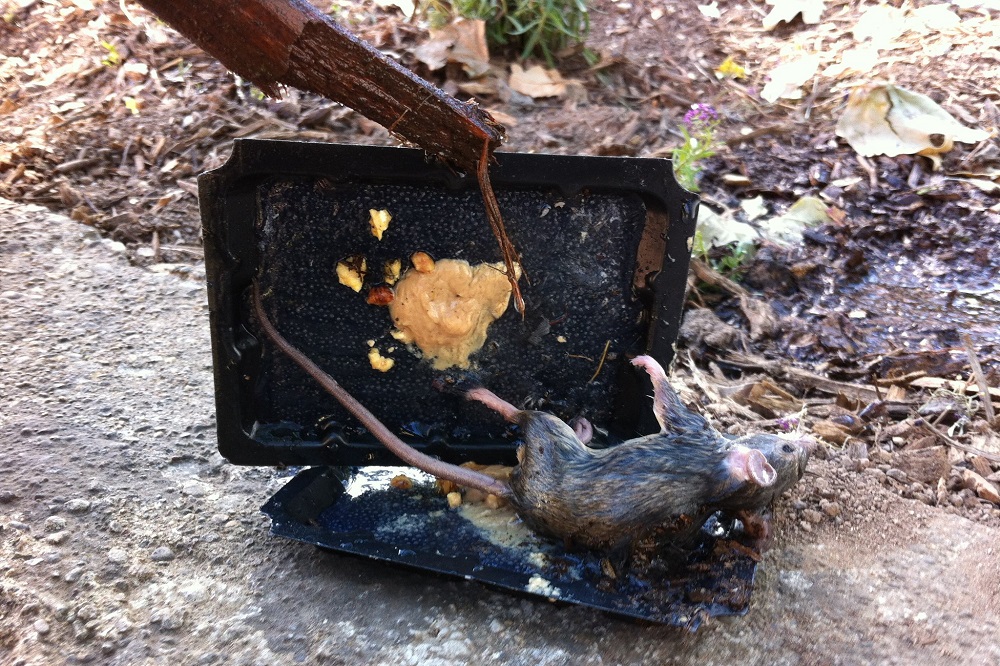Daily Express warns law banning ‘inhumane’ rat traps will lead to food shortages in Wales

The Welsh Government’s plans to introduce a ban on glue boards, which are used by trap vermin, will shut hospitals and lead to food shortages in Wales, according to the Daily Express.
Claiming the ban puts the welfare of rodents above people in Wales, the newspaper claims it has seen a briefing by the British Pest Control Association which warns that banning the traps will lead to “food shortages across swathes of Wales” and result in hospital departments, schools, nursing homes, restaurants, pubs, supermarkets and any other public venue with food completely shut down for weeks if a rat or mouse is found.
Glue traps, also known as “glue boards” or “sticky boards”, consist of a sheet of plastic, cardboard or wood coated with non-drying adhesive designed to trap rodents such as mice and rats as they cross the board.
Once trapped, in attempting to free themselves, animals can rip out patches of fur, break bones or even gnaw through their own limbs to escape.
Unattended animals die slowly from dehydration, starvation or exhaustion.
Poison
A source quoted by the Daily Express said: “Deploying glue boards are a rapid way of despatching said rat.
“If no glue boards are allowed, then poison has to be set down. It can take up to two weeks for the rat to eat the poison.
“It then scuttles away and dies slowly somewhere a few days later.
“If, for example, rat dies behind a fridge, it can take another few days to work out where it is. The contents of the fridge would be deemed unsafe.
The source added: “Same for school canteens. Where will kids eat? Where will kids go if a school is closed? Where will the residents go if a nursing home has to temporarily close?
“A family run restaurant could be shut down for weeks.
“Single restaurants run on slim margins. Where will they make up that money from?
“A grocery shop in a rural village in Wales with an elderly population. What happens to the elderly villagers if they rely on the shop for groceries and provisions?”
Agriculture bill
Proposals for a complete ban on the use of snares and glue traps were announced last September as part of the first-ever Welsh Agriculture Bill.
Launching the Bill, Minister for Rural Affairs Lesley Griffiths said: “These devices catch animals indiscriminately, causing great deal of suffering, and they are not compatible with the high animal welfare standards we strive for here in Wales.
“A complete ban is the only way forward.”
RSPCA Cymru welcomed plans to introduce the ban after attending regular meetings with the Welsh Government where it highlighted the negative impact that snares and glue traps have on animal welfare in Wales.
It says glue traps are cruel, indiscriminate and inhumane because they leave rodents to starve to death.
Support our Nation today
For the price of a cup of coffee a month you can help us create an independent, not-for-profit, national news service for the people of Wales, by the people of Wales.






I don’t like glue traps, they are cruel, at least poison is quicker. Yes, we want to make our kitchens etc more hygienic but unnecessary suffering is wrong. However, I don’t think this report in one of the right wing rags has the anything to do with food shortages and kitchen hygiene but instead Senedd bashing. Any opportunity to do so is written into the paper’s DNA. It shows us all one thing – they fear independent Welsh thought and ideas. Why? Because one day it will lead to independence.
Many raptors and other predators die from consuming rats that have been poisoned.
Total nonsense. When I was body-every-self in my wife’s cafe I used spring-loaded rat traps baited with chocolate. They are very effective and kill very quickly. I agree that glue traps are cruel and wrong. I don’t hate rats. The old rat fart I have seen on a trail camera in my garden is quite impressive and non-destructive. I’ll put up with him so long as he keeps the other rats under control, which I think is the reality. Otherwise the chocolate and spring traps will be deployed. Be kind(ish), people.
News outlets like this gave up any pretence of being serious, when writing articles like this year’s ago. This is pure sensationalism, written for the particular demographic that want to purchases such drivel. Best ignored this side of the border.
Rats and Cockroaches will be around long after we have gone. We could try using our massive brain and invent something like a mini-drone or a little, short legged dog that hates rats…
As fan of Terry Pratchett, the headline to the article made me wonder if the author was having fun by implying that fewer rats caught would mean less rats available as food. For those who don’t read Pratchett, in the city of his books one of the races is the Dwarfs who are miners, small and fierce, though much of that is alocholic bravado. Their favourite food is rat cooked in a whole variety of ways. The link, of course is that Cymru is a land of miners, who are often small in stature (at least in my family!), and… Read more »
So difficult to harmonise our real experience of vermin and then an acceptance of “a Humane killing’ when a loved one’s survival’s at stake?
The Express is a bigger danger to food shortages. Their brexit lies have again left shop shelves empty and made food buying hard work. Rats can be a pain, but also have a right to life..
The Daily Express is less trustworthy than a forged nine pound note.